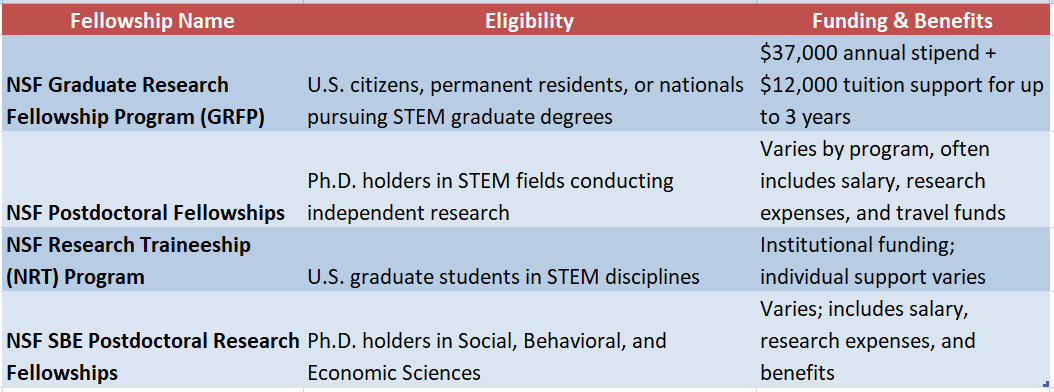Securing a National Science Foundation Fellowships is a big deal for many students. These fellowships not only provide financial support but also open doors to exciting research opportunities. Understanding how to get one can set you on a path to success in your academic career. Let’s dive into why these fellowships matter!
National Science Foundation Fellowships are prestigious awards that help students pursue their dreams in science and engineering. Here’s why they are so important:
Benefits of National Science Foundation Fellowships
- Financial Support: These fellowships offer grants for graduate programs, easing the burden of tuition and living expenses.
- Research Opportunities: Recipients often gain access to unique research projects that can enhance their learning and career prospects.
- Networking: Being a fellow connects you with a community of scholars and professionals, which can lead to future collaborations.
- Career Boost: Having a National Science Foundation Graduate Fellowship on your resume can make you stand out to employers and academic institutions.
In summary, understanding the importance of National Science Foundation Fellowships can motivate you to pursue one. With the right preparation and dedication, you can secure this valuable opportunity and take your academic journey to the next level!
Contact Now to Pursue Your Dream Degree From Your Nearest College
What Are the Eligibility Criteria for NSF Fellowships?

Securing a National Science Foundation Fellowship can be a game-changer for your academic journey. These fellowships provide vital support for students pursuing advanced degrees in science, technology, engineering, and mathematics (STEM). Understanding the eligibility criteria is crucial to ensure you’re on the right track to apply for these prestigious grants for graduate programs.
To be considered for a National Science Foundation Graduate Fellowship, applicants must meet specific requirements. Here’s a quick overview:
- Citizenship: You must be a U.S. citizen, national, or permanent resident. This ensures that the fellowship supports those who will contribute to the U.S. scientific community.
- Academic Standing: You should be enrolled in or planning to enroll in a graduate program in an eligible field. This is vital for receiving the necessary support for your studies.
- Previous Awards: If you’ve received a similar fellowship before, you may not be eligible. It’s essential to check the guidelines to avoid any surprises!
Meeting these criteria is the first step toward securing a National Science Foundation Fellowship. By understanding what’s required, you can tailor your application to highlight your strengths and experiences effectively.
Crafting a Compelling Research Proposal for Your NSF Application
Crafting a strong research proposal is crucial when applying for National Science Foundation Fellowships. This document is your chance to showcase your innovative ideas and demonstrate how they align with the NSF’s mission. A compelling proposal can set you apart from other candidates and increase your chances of securing funding for your graduate studies.
Understand the NSF’s Goals
Before you start writing, familiarize yourself with the National Science Foundation’s goals. They seek to support projects that advance knowledge and benefit society. Tailor your proposal to reflect these priorities, emphasizing how your research contributes to the broader scientific community.
Key Elements of a Winning Proposal
- Clear Objectives: Clearly state your research questions and objectives. What do you aim to discover?
- Methodology: Describe your research methods. How will you conduct your study?
- Impact: Explain the potential impact of your work. Why is it important?
- Budget: Outline how you plan to use the funding. Be realistic and detailed.
By focusing on these elements, you can create a proposal that not only meets the NSF’s criteria but also stands out in a competitive field. Remember, this is your opportunity to shine and secure those valuable grants for graduate programs!
How to Secure Strong Letters of Recommendation for NSF Fellowships?
Securing a National Science Foundation Fellowship can be a game-changer for your academic career. One crucial part of your application is the letters of recommendation. Strong letters can set you apart from other candidates, showcasing your skills and potential to the selection committee. So, how do you ensure your recommenders write glowing endorsements?
Choose the Right Recommenders
Start by selecting individuals who know you well. This could be professors, research advisors, or even employers. They should be able to speak to your strengths and experiences relevant to the National Science Foundation Graduate Fellowship. A personal connection can lead to a more heartfelt and detailed letter.
Provide Helpful Information
Once you’ve chosen your recommenders, provide them with all the necessary information. Share your resume, details about the National Science Foundation Fellowships, and your goals. This helps them tailor their letters to highlight your achievements and fit for the fellowship. Don’t forget to give them plenty of time to write!
Follow Up and Thank Your Recommenders
After they submit their letters, a simple thank-you note goes a long way. It shows appreciation for their time and effort. Remember, securing grants for graduate programs like the NSF Fellowship is a team effort, and your recommenders are key players in your success.
Contact Now to Pursue Your Dream Degree From Your Nearest College
Navigating the Application Process: Tips and Best Practices
Securing a National Science Foundation Fellowship can be a game-changer for your academic career. These fellowships not only provide financial support but also open doors to prestigious research opportunities. Understanding how to navigate the application process is crucial for aspiring scientists and researchers. Let’s dive into some tips and best practices to help you succeed!
Start Early and Research Thoroughly
Begin your journey by researching the National Science Foundation Fellowships. Familiarize yourself with the eligibility criteria and the specific requirements for the National Science Foundation Graduate Fellowship. This knowledge will help you tailor your application effectively.
Craft a Compelling Personal Statement
Your personal statement is your chance to shine! Make sure to:
- Share your passion for your field.
- Highlight your achievements and experiences.
- Explain how the fellowship will help you achieve your goals. A well-crafted statement can set you apart from other candidates.
Seek Feedback and Revise
Before submitting your application, seek feedback from mentors or peers. They can provide valuable insights and help you refine your proposal. Remember, a polished application can make a significant difference in securing those coveted grants for graduate programs.
How Can CollegeDegree.Education Help You Prepare for Your NSF Fellowship Application?
Securing a National Science Foundation Fellowship can be a game-changer for your academic career. These fellowships not only provide financial support but also open doors to incredible research opportunities. So, how can CollegeDegree.Education help you prepare for your NSF Fellowship application? Let’s dive in!
Expert Guidance
At CollegeDegree.Education, we offer expert guidance tailored to your unique research interests. Our team understands the ins and outs of National Science Foundation Fellowships, ensuring you present a compelling application that stands out.
Resources and Workshops
We provide a wealth of resources, including workshops focused on writing effective proposals. These sessions cover everything from crafting your research statement to understanding the nuances of grants for graduate programs. You’ll feel more confident and prepared!
Peer Support and Networking
Additionally, you’ll connect with peers who are also applying for the National Science Foundation Graduate Fellowship. Sharing experiences and tips can be incredibly beneficial. Remember, you’re not alone on this journey! In conclusion, with the right support from CollegeDegree.Education, you can enhance your chances of securing a National Science Foundation Fellowship. Let’s make your application shine!
Common Mistakes to Avoid When Applying for National Science Foundation Fellowships
Applying for National Science Foundation Fellowships can be a game-changer for your academic career. However, many applicants stumble over common pitfalls that can easily be avoided. Understanding these mistakes is crucial to securing grants for graduate programs and standing out in a competitive field.
Ignoring the Guidelines
One of the biggest blunders is not following the application guidelines. Each National Science Foundation Graduate Fellowship has specific requirements. Make sure to read the instructions carefully and tailor your application accordingly.
Weak Personal Statements
Your personal statement is your chance to shine. Avoid vague language and focus on your unique experiences. Highlight how your background aligns with the fellowship’s goals. Remember, this is your story—make it compelling!
Overlooking Letters of Recommendation
Strong letters of recommendation can make or break your application. Choose recommenders who know you well and can speak to your strengths. Provide them with your resume and details about the fellowship to help them write a more personalized letter.
By steering clear of these common mistakes, you can enhance your chances of securing a National Science Foundation Fellowship and advancing your academic journey.
Contact Now to Pursue Your Dream Degree From Your Nearest College
FAQs
-
What is the NSF Graduate Research Fellowship Program (GRFP)?
The NSF GRFP is a prestigious fellowship that provides financial support to graduate students in science, technology, engineering, and mathematics (STEM) fields. -
Who is eligible for the NSF GRFP?
U.S. citizens, nationals, or permanent residents who are pursuing a research-based master’s or doctoral degree in eligible STEM fields at accredited U.S. institutions. -
How much funding does the NSF GRFP provide?
The fellowship includes a $37,000 annual stipend and a $16,000 cost-of-education allowance for up to three years. -
What disciplines are covered under the NSF GRFP?
NSF supports research in various STEM fields, including life sciences, engineering, computer science, mathematics, physics, and social sciences. -
Can I apply for the NSF GRFP if I am already in graduate school?
Yes, but you can apply only once while enrolled in graduate school, typically in your first or second year. -
When is the NSF GRFP application deadline?
Deadlines vary by field of study but typically fall in October each year.


